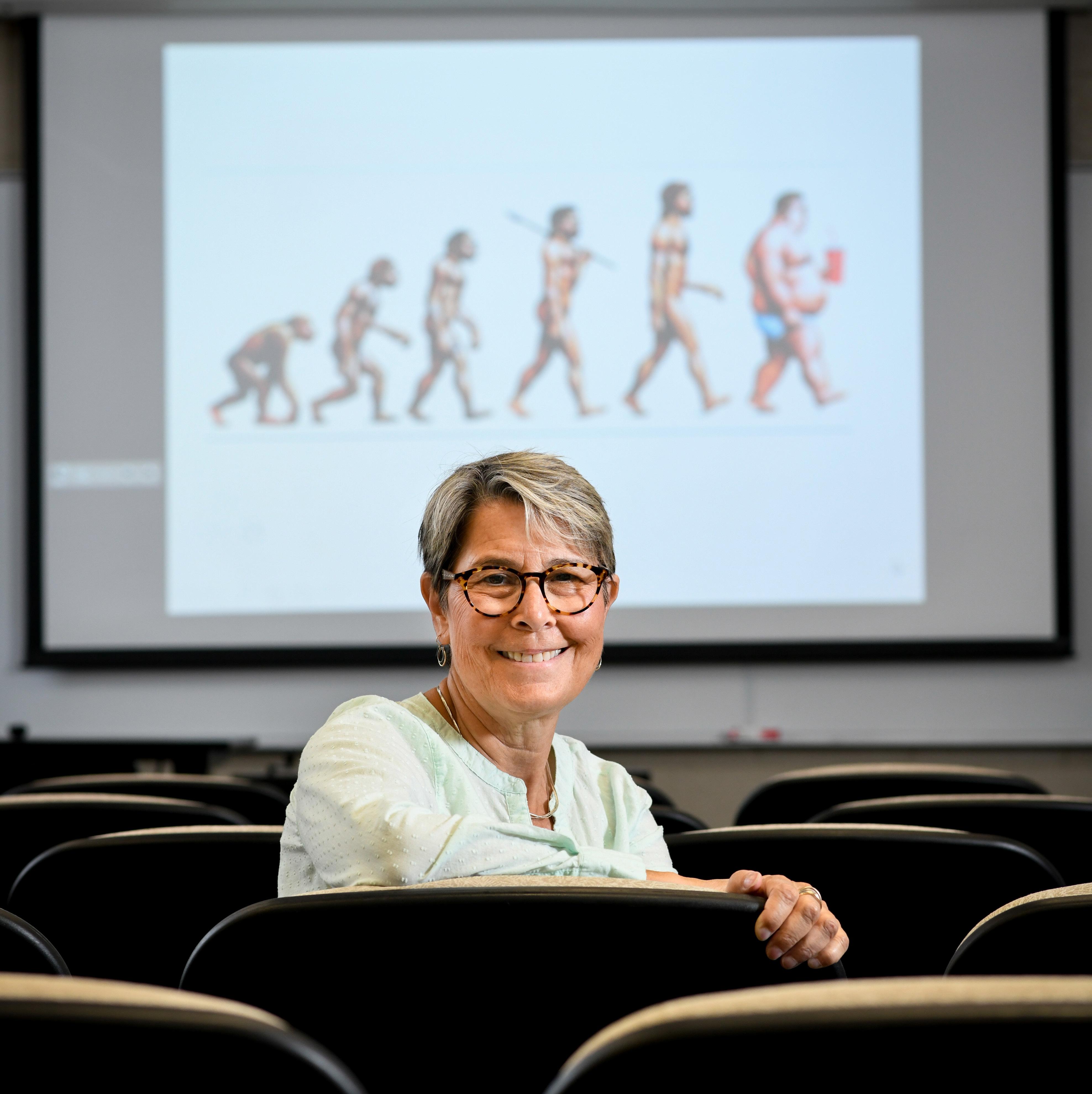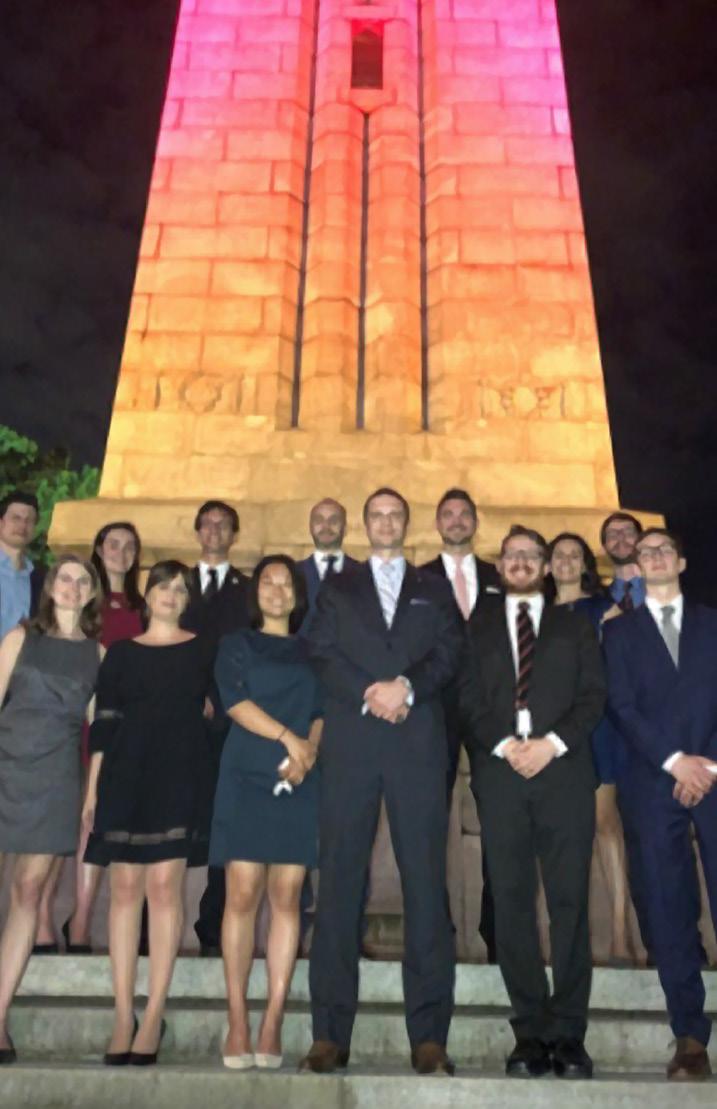
8 minute read
A Legacy of Leadership and Growth
By Juliana Mccully
Sarah Ash helped create the department’s major in nutrition and developed a critical reflection model where students connect community learning experiences to what they have learned in class.
They say she's a legend at NC State, and it's not just because she helped create and oversee the development of the major in nutrition. Sarah Ash, Ph.D., is a teacher, a mentor, advisor and friend. A scientist, writer, leader and critical thinker with a commitment to students, colleagues and learning based on relationships, growth and grace.
"She's the reason we're all here," said Natalie Cooke, Ph.D., who has called her both "Dr. Ash," as her teacher, and "Sarah," as a friend and colleague. “Our program is strong because Sarah created it and has continued to make sure it has rigor and that students stretch and grow.
“Every class is thoughtful, and she made sure it was focused on nutrition science,” said Cooke, assistant professor and undergraduate coordinator for nutrition science. “Other programs may focus on application, but our program really stands out for scientific inquiry and communitybased learning.
“She’s a legend; everyone knows her at the university. She’s deeply respected and has made a significant impact.”
Food Fads and Nutrition Science
In 30 years at NC State, the professor who built a career around reflection has seen nutrition trends come and go - from no-fat and low-fat to coconut oil, kale, coffee and keto. Plenty has changed, and the frontiers of nutrition remain rich, but the science, students and science education haven’t changed all that much, she said.
It comes back to reflection, relationships and learning how to think critically.
“You can have answers in a nanosecond, but what’s important is to give students practice in thinking critically – learning how to learn, think, process and adapt,” she said.
Nutrition research has exploded in the past 30 years, but drawing meaning from the science is complex.
“Nutrition is an interesting field – fascinating, frustrating and complex,” Ash said. “Certainly, what we eat can affect our health, but once we discovered all the essential vitamins and minerals, nutrition research became complicated because no matter what compound, any relationship to health has so many factors – the food itself, the body, genetics.
“Our ability to even really know what people eat is increasingly fraught, yet it’s really the only tool we have,” she said. “Media stories point to this thing or that thing – when I was in graduate school, it was fats. The microbiome is very hot right now, food as medicine, and I hear inflammation is back. Even in mainstream nutrition research, something will get a lot of attention – vitamin D, antioxidants, fish oil, and it becomes a solution for everything.
“There are interesting theories and observations, but it’s very hard to study, and every population is different, Ash said. “Often, large-scale clinical trials that directly test hypotheses just don’t pan out – the exception is studies that look more at patterns than components.
“It isn’t that we shouldn’t keep asking the questions,” she said. “It’s how we phrase the answers. Even in the scientific community, there’s a lot of over-selling.
“As scientists, we’re trained to be very productive and get it down to the answer, like when it was vitamin C or niacin. But we are beyond that now, so it’s these big pictures with complex combinations of things. That may be what genetics (especially genome mapping at the individual level) can show us,” she said.
The Real DEAL Legacy
Even as students have the opportunity to take classroom learning into the community with service-learning projects, you see that the big concerns we have are all complex, and there are no simple approaches, Ash said.

“I hope they come away with [the] ability to ask the right questions. to do it,” she said. “Critical reflection is an approach that resonates I hope they know they need to ask questions and to be sure with me.” they’re always questioning their assumptions.” Examine, Articulate Learning) to help students identify and community- or service-learning setting. Service learning applies what they’ve learned about themselves; what they’ve learned and they say ‘great,’ but it doesn’t get The model also allows the instructor to assess what students And that was my job, to hold up the mirror, to model, to provide Increasingly, Ash said, it’s about learning the bigger-picture things: A critical reflection tool for doing just that may be her legacy to the “With nutrition, you need to compare what we used to know with university and the field. what we know today and what we’ll need to know tomorrow. Ash and colleagues developed the DEAL model (Describe, of humility.” process, in a structured way, what they have learned in a Humility, Humanity, Excellence academic concepts in the community to address problems. That legacy and the reflection tools embodied by DEAL are just The DEAL model connects those experiences to course material; years at the university, contributions that colleagues and students challenges beliefs and assumptions; leads students to consider say belie her own humility. about how an organization works to meet collective objectives; “Sarah was the first person I met at NC State,” said Suzie Goodell, and to articulate that in writing. Ph.D., associate professor of nutrition and director "She's the reason we're of the nutrition graduate program. “When I came Ash has been a campus leader in developing courses and pedagogy for experiential all here. Our program to interview for my job, she picked me up from the airport, took me to lunch, and introduced me to life learning, and the DEAL method is used on is strong because as a faculty member in FBNS. If I was nervous, I campuses nationwide and internationally. Sarah created it and don’t remember it. She made me feel like I was with “From a scholarly perspective, the model is has continued to make an old friend, but we’d just met. used and cited quite a bit in the literature,” sure it has rigor and “I call our department ‘the happiest place in she said. “And a lot of people have found it to be very helpful, especially in experiential that students stretch academia,’ in no small part to how Sarah made me feel like FBNS was my academic home and would learning. You ask the student how it was, and grow." be forever,” Goodell said. to anything deeper than that. As T.S. Eliot said, ‘We had the “She set the tone for what Suite 218 has become – a place where experience but missed the meaning,’ and that’s what the DEAL students feel like they can stop by and say ‘hi,’ or close your door method tries to get.” and cry; a place where people inside truly care about you as are learning. “Sarah showed me that students in our classrooms are people “Earlier on in teaching, I assumed students could do it because classes, there is an underlying cause to their struggle. We, as I could do it,” Ash said. “Then, I realized that it’s not as plain as compassionate educators, should seek to understand the the nose on your face. You can’t see your nose; you need a mirror. backstory and help where we can.” Science is an ever-changing process, and you need a little bit part of the profound personal influence Ash has brought to her a person. outside of school, and when students are struggling in our extensive comments. Goodell pointed to one of her mentor’s most helpful mantras: When working with a student, think about how you would want “The challenge for university education will always be how do you someone to treat your daughter. Then, “give grace to those balance the time it takes to teach well and the time the faculty has who make mistakes and don’t have it all together but hold them
accountable, so they will learn to do better next time.”
When Natalie Cooke was an undergrad, she was referred to Ash because of her interest in the subject: “I walked out of her office and decided I wanted to add nutrition as a second major. She connected me to research, and through that experience, I got to collaborate on service-learning research projects. I eventually went on to get a Ph.D., and she was on my doctoral committee.
“Sarah taught me what service-learning programs are and how we can connect students to community partners. Sarah introduced us to the DEAL method, best practices, and she helped me develop my knowledge in that area. I can always go to her for advice, and I know she’s going to give me a good answer, because she thinks critically, as she teaches her students to think critically,” Cooke said.
“She’s a fantastic writer, which you can see in her scholarly work, and she helped mentor me as a writer. As an educator, she teaches students to contribute their thoughts to classroom discussion; will walk students through difficult concepts with great clarity and helps them build confidence. She’s an educator in so many capacities, truly so skilled and creative about engaging students in the classroom.
“She taught me a lot about advising and understanding students as individuals, their strengths, and how to help encourage them to pursue internships and volunteer experiences that will get them out in the community and the workplace, building valuable transferable skills. She taught me the ropes, and when it came time for Sarah to retire, I had the opportunity to take over that undergraduate advising role.
“I am lucky that Sarah is a mentor, a teacher, and she is my friend.”
It’s the Students
There have been accolades, published works, and thousands of students in her 30 years of teaching, inquiry, advising and mentorship, and the time has flown.
“It doesn’t seem like 30 years; it really doesn’t,” she said.
Ash is still sorting out what’s next but is worried she’ll miss it.
“It’s interesting being in a university environment; understanding how people think and learning how to think; asking questions, challenging, and coming up with solutions,” she said. “It’s just very intellectually engaging.”
"It all comes back to the students," Ash said.
“In the end, that’s what motivated me: When a student makes those connections or says, ‘I never thought about it that way.’ When you run into them at the grocery store 20 years later, and they remember your class – it’s just really exciting and rewarding.”







